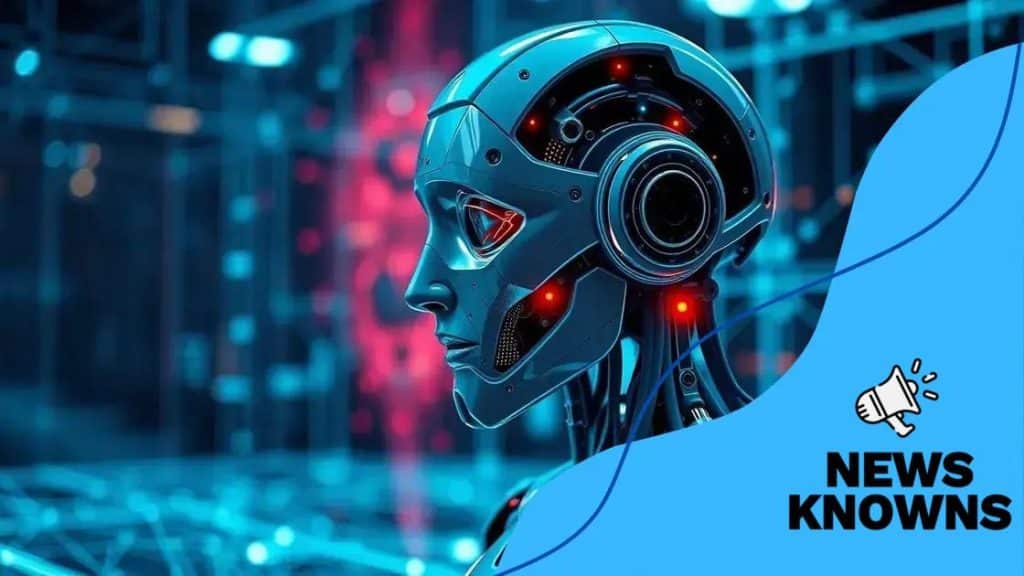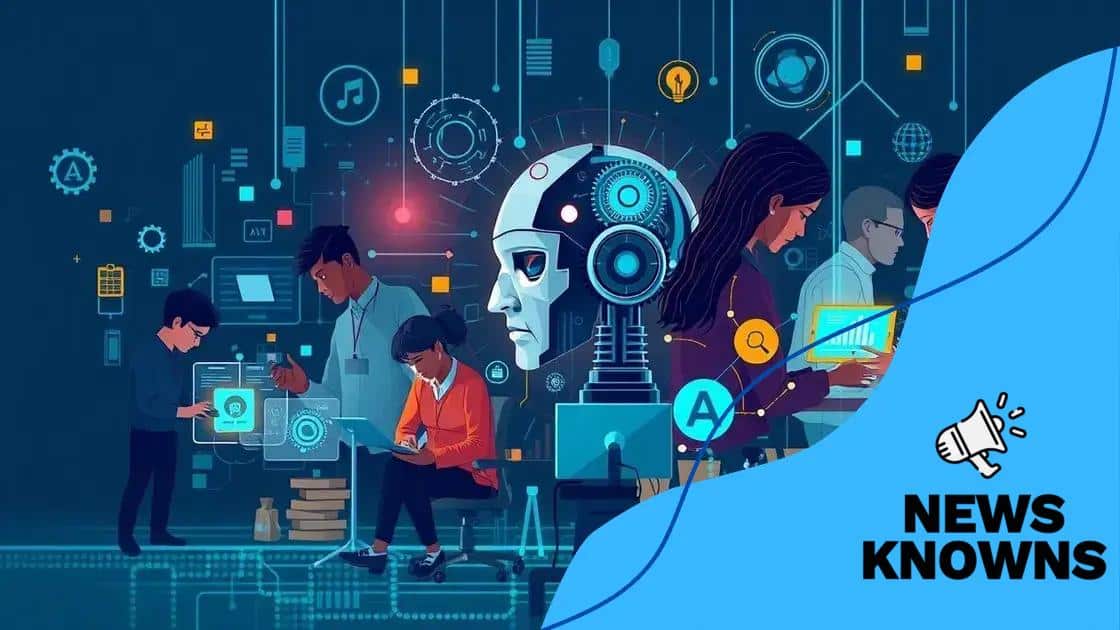Nvidia invests $500B in AI: What it means for the industry

Anúncios
Nvidia’s $500 billion investment in AI is set to drive significant advancements, enhance automation, and reshape job markets, while also raising important ethical considerations regarding bias and privacy.
Nvidia invests $500B in AI, a bold move that could reshape the tech landscape. Have you ever wondered how such an investment might change the way we interact with technology?
Anúncios
The significance of Nvidia’s investment
Nvidia’s decision to invest $500 billion in AI is a game changer in the tech world. This massive investment signals a commitment to innovative technologies that could redefine numerous industries. Not only does it enhance Nvidia’s position in artificial intelligence, but it also promises to accelerate advancements that can make everyday life easier.
Why is this investment important?
With this substantial funding, Nvidia aims to dominate the AI market. But what does this mean for businesses and consumers? One significant aspect is the potential for improved technology integration in various sectors.
- Enhanced machine learning capabilities.
- Better data processing in real time.
- Increased efficiency in operations.
Moreover, as Nvidia develops its technologies, we can expect greater accessibility to AI for smaller companies. This will allow them to harness AI solutions that were once available only to large corporations. Hence, the playing field in many industries may become more balanced.
Anúncios
Potential impacts on emerging technologies
Nvidia’s investment also fosters innovation. With more resources, developers can create applications that utilize AI in ways we haven’t seen yet. Imagine how AI could enhance healthcare, education, and even entertainment.
- More personalized health solutions based on AI analysis.
- Innovative learning tools tailored to individual students.
- Interactive gaming experiences driven by advanced AI algorithms.
As these technologies spring forth, they could lead to new job opportunities and shape how we interact with machines. Yes, change can be daunting, but it often brings exciting advancements. As Nvidia pioneers these changes, staying informed will help you adapt and benefit from the developments more readily.
Nvidia’s investment in AI represents a bold step into the future. As we see its effects unfold, we should remain curious about how these changes will shape our world.
How AI advancements will shape various sectors
Advancements in AI are set to transform many sectors dramatically. The integration of artificial intelligence into everyday operations leads to more efficient processes and innovative solutions. Companies are already beginning to harness the power of AI to analyze data and improve decision-making.
Impact on Healthcare
In the healthcare sector, AI is making significant strides. Technologies such as machine learning can assist in diagnosing diseases faster and more accurately. With algorithms analyzing medical imagery, we see:
- Early detection of conditions like cancer.
- Personalized treatment plans based on patient data.
- Improved patient monitoring through wearable devices.
These improvements are not just enhancing patient care but are also streamlining operational efficiency in hospitals and clinics.
Benefits for Education
The education sector is also experiencing the effects of AI. As schools adopt AI tools, students benefit from tailored learning experiences. AI can provide:
- Interactive lessons that engage students better.
- Real-time feedback for learners and educators.
- Adaptive learning platforms that cater to individual needs.
This technology shifts the traditional education model, making it more responsive and effective.
As Nvidia continues to invest in AI, we can expect further enhancements across different fields. In finance, for example, machine learning algorithms are already optimizing trading strategies and risk management.
In manufacturing, AI enables predictive maintenance, reducing downtime and improving product quality. By integrating these advanced technologies, businesses can stay competitive in an ever-evolving marketplace.
Each sector’s transformation through AI opens up new possibilities for innovation and growth. With these advancements, our work and personal lives are set to change profoundly.
Potential impact on job markets

The rise of AI technology brings exciting opportunities but also challenges for job markets worldwide. As Nvidia invests heavily in AI, we must explore how these advancements will reshape employment and the skills needed in the future.
Job Creation and Transformation
While some fear that AI will replace jobs, the reality is more complex. Many positions will evolve rather than disappear. For instance, roles in data analysis, machine learning, and AI ethics will grow significantly. Companies will need:
- Data scientists to interpret AI outputs.
- AI specialists to develop new technologies.
- Ethics officers to address moral implications of AI.
As a result, this changing landscape emphasizes the importance of continuous learning and adapting to new tools.
Displacement of Certain Jobs
On the flip side, AI could displace jobs that rely heavily on routine tasks. For example, roles in manufacturing and administrative support might see reductions as machines take on those responsibilities. This shift in labor demands a transition strategy to help workers adapt to new job roles. Transitioning to new positions may require reskilling and further education.
As we embrace AI, understanding which sectors are most affected is crucial. Sectors like transportation, customer service, and even agriculture are transforming due to AI integration.
Developing New Skills
To thrive in an AI driven world, workers must prioritize developing relevant skills. Skills such as critical thinking, creativity, and tech-savviness will be in high demand. Here are key areas of focus:
- Adaptability to new software.
- Understanding data and analytics.
- Emphasis on AI ethics and responsible use.
Workers who invest in these skills will position themselves advantageously in the job market. Employers will appreciate the proactive approach to understanding and implementing AI technologies.
Overall, the impact of AI on job markets is multifaceted. While changes may be disruptive, they also offer substantial opportunities for growth and innovation. Being prepared for this transition is essential for workers and businesses alike.
Challenges and ethical considerations of AI
The rise of AI brings not only benefits but also significant challenges and ethical considerations. As companies like Nvidia push the boundaries of technology, addressing these concerns is crucial for safe and responsible use.
Understanding Bias in AI
One major issue is bias in AI systems. If the data used to train AI is biased, the outcomes will reflect that bias. This can lead to unfair treatment and discrimination in various applications, from hiring practices to law enforcement. For example, algorithms used in job recruiting may favor certain demographics based on flawed data. Tackling bias is essential to ensure fairness in AI decisions.
Privacy Concerns
Another significant challenge relates to privacy. With AI systems collecting and analyzing vast amounts of personal data, the risk of misuse increases. People often worry about how their information is used and who has access to it. Companies must prioritize data protection and develop transparent policies to build trust.
- Implement rigorous data encryption.
- Limit data access to necessary personnel.
- Regularly audit data usage practices.
By taking these precautions, firms can work towards more responsible AI deployments that do not compromise individual privacy rights.
Ethics in Decision-Making
The ethical implications of AI extend to decision-making processes as well. For instance, using AI in healthcare can be life-saving, but it raises questions about accountability. If an AI system makes a faulty recommendation, who is responsible? Ensuring a balance between technological advancement and ethical responsibility is vital.
Moreover, as AI systems become more autonomous, they will need to operate within ethical guidelines. This means developing frameworks that address moral dilemmas faced by AI systems, such as prioritizing human safety over efficiency.
As we move forward, engaging in discussions about challenges and ethical considerations will shape the future of AI. It is essential for developers, policymakers, and society to work together to create a trustworthy and ethical AI landscape.
Future trends in AI and technology
The future of AI and technology is promising and full of potential. With continuous investments from leaders like Nvidia, we can expect remarkable advancements that will shape various aspects of our lives.
Increased Automation
One major trend on the horizon is the rise of automation in many industries. As AI technology improves, more tasks will become automated, streamlining processes and increasing efficiency. This includes:
- Automating routine administrative tasks.
- Streamlining supply chain management through predictive algorithms.
- Enhancing customer service with chatbots and virtual assistants.
Automation can free up human resources to focus on higher-level tasks that require creativity and critical thinking.
AI in Everyday Life
Another exciting trend is the integration of AI into everyday life. From smart homes to personalized recommendations, AI will influence how we interact with technology. Devices such as smart speakers can learn user preferences, providing a tailored experience. Additionally, as AI becomes more accessible, individuals can use it for:
- Health management apps that monitor wellness.
- Education tools that adapt to learning styles.
- Finance applications that offer personalized budgeting advice.
These innovations are likely to enhance convenience and improve the quality of life for many.
Ethical AI Development
As technology evolves, ethical considerations will become increasingly important. Developers must prioritize creating AI systems that are fair and transparent. The focus will be on:
- Reducing bias in AI algorithms.
- Ensuring user data privacy and security.
- Implementing frameworks for responsible AI use.
By tackling these ethical challenges, we can shape a future where AI benefits everyone.
Looking ahead, we can anticipate more collaborative robotics, smarter AI systems that assist humans, and advancements in machine learning technologies that will open up new possibilities. As these trends develop, staying informed will help us navigate the changes and harness the benefits of this evolving landscape.
In conclusion, the investment of $500 billion by Nvidia in AI opens up exciting possibilities while also presenting challenges. As AI continues to evolve, it’s essential for individuals, businesses, and societies to adapt. By embracing the advancements, we can capitalize on new opportunities, improve efficiencies, and address the ethical considerations that arise. Staying informed and proactive will help us navigate the future landscape of technology and work.
FAQ – Frequently Asked Questions about AI Investment by Nvidia
What are the main benefits of Nvidia’s $500 billion investment in AI?
The investment is expected to boost innovation, create new jobs, and enhance efficiency across multiple sectors.
How will AI affect job markets?
AI will transform job roles by automating routine tasks while creating demand for new skills and positions in emerging technologies.
What ethical considerations should be addressed with AI development?
It’s essential to tackle issues such as bias in algorithms, privacy concerns, and ensuring accountability in AI decision-making.
How can individuals and businesses prepare for the future of AI?
Continuous learning, adapting skills, and staying informed about technological advancements will be key in navigating the AI landscape.





